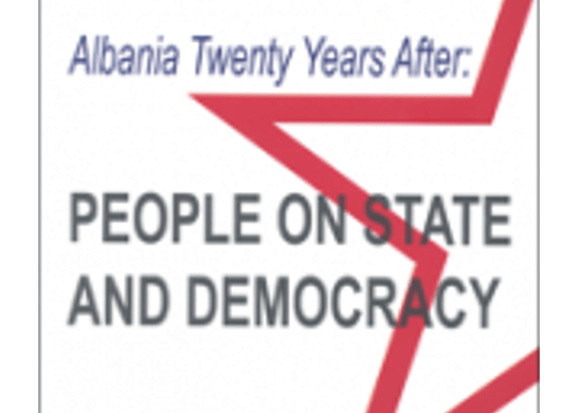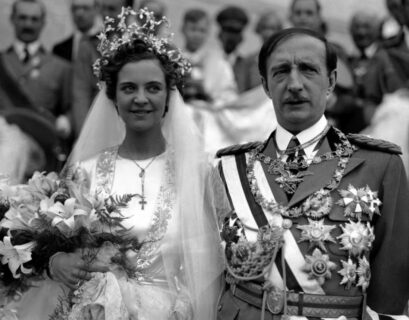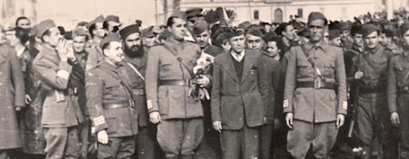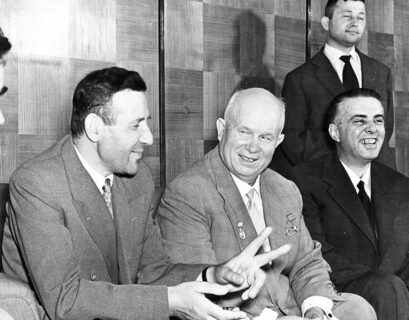By Ph. D. Albert Rakipi
…Weak or failing institutions, eroding legitimacy of political institutions, distrust of political parties, consolidated corruption, high degree of state capture, no clear division between what is public and what is private, a blur and sustained political tensions can no longer be considered temporary distortions or symptoms of a transition towards democracy. It is becoming increasingly evident that these phenomena are not characteristics of a transitory period but tangible products that threaten to become permanent features of the Albanian political landscape….
The above findings stem from a comprehensive study on transition that the Albanian Institute for International Studies (AIIS) undertook ten years ago. Unfortunately this decade old study conclusions about the Albanian post communist transition are still entirely relevant for present day Albania. As in this issue Tirana Observatory is observing Post Communist Albania, 30 years after the end of communist regime, we decided to republish the AIIS study of 2010.
Introduction
The post-communist transformation – widely known as the transition –has been theoretically and practically thought of as an endeavour with two basic, closely-related components: replacing the totalitarian/authoritarian regimes with democratic governments and moving from a centralized socialist economy to a free market economic system. Both these components were fundamental goals of political elites that came to power following the collapse of communism in 1989 and 1991 in the former communist countries of Eastern Europe.
But while the goals were similar in most countries in transition, success in achieving them was determined primarily by the legacy of the economy and politics not only under communism, but also by the tradition of the state, the level of economic development, the degree of industrialization and the scale of the country’s modern society.
The success stories seen mostly in Central Europe are primarily associated with the existence of somewhat industrial societies and the existence of capitalist practices before these countries fell under communist domination. Such success has also been linked to previous, relatively early experiences of a democratic tradition, including a considerable degree of modernization of societies in these countries.
Albania has experienced a transition featuring many steps forward and steps backward. It has also been a transition which after two decades cannot be with certainty defined as a completed transition. In the case of Albania, the most likely and most complete explanation behind its long and problematic transition is tied, first and foremost, to the relatively new state tradition. Its low rate of industrialization and the agrarian economy led to a long process of state building. The entire history of the modern Albanian state is tied to events that are no older than 100 years, where capitalist and liberal experiences were sporadic and where the even rarer democratic experiences were left in an embryonic stage before being crushed by the communist domination.
So when reviewing the Albanian transition, above all, one must take into consideration the country’s pre-communist legacy.
Second, success and the required time to get through the transition from totalitarian/ authoritarian regimes was influenced significantly by the different forms that undemocratic regimes took and developed in the former communist East. Contrary to authoritarian regimes that gradually began to allow a certain degree of liberalism in a number of Eastern countries, communist Albania remained an unparalleled Stalinist dictatorship until the last throes of the communist domination. Initially installing a one-party system, in the last two decades of the regime Albania became a dictatorship under the personal tyranny of Enver Hoxha. It was little more than sultan-like governance.
The difference between personal dictatorship and a one-party regime is essential in terms of relations between the state and society through a social contract. While a one-party regime can allow for minimal “negotiation” of sorts on the contract between society and the state, in the case of the personal dictatorship in Albania, one could not even talk about a social contract.
The above-mentioned factors not only explain the prolonged transition of post-communist Albania, but also suggest the need for a new theoretical paradigm for understanding and explaining transition in countries like Albania. In a considerable number of countries of the former Communist East, post-communist transition meant replacing authoritarian regimes with democratic regimes and planned socialist economies with capitalist market economies. In the case of Albania, the transition should be understood primarily as a process of genuine state-building.
Michael Mandelbaum’s suggestion that post-communism refers to both the past and the future, may at first glance be valid for all countries in transition. This could include Albania despite its different degree of social thinking and behaviour and the political and economic transformation involved. However, it would be difficult to apply it to the degree of the state-building process. Albania’s experience in the last two decades of post-communism suggests the transition was neither an adaptation nor a social, political or economic transformation, but a genuine process of state building.
While Mandelbaum suggests the idea of continuity – that post-communism refers at the same time to the past and the future – in Albania’s case, there are difficulties in including the country in this category if we bear in mind that Albanian post-communism was not a continuation of what was interrupted five decades ago. Many components of the state, institutions, laws and documents that led to a social contract between society and state, in the case of Albania, were not renewed and adapted, but were essentially started from scratch. This was a social contract that was to be “negotiated” for the first time.
But what is Albania like twenty years after the collapse of the communist regime?
Executive Summary
To anyone who visited Albania under the communist rule, there must have been a feeling of visiting another planet, and that someone must have turned back time for at least half of a century, as Karl Kaser of the University of Graz points out. And in the twenty years since the fall of communism, no country of the former East may have changed more than Albania.
Twenty years after the fall of the Berlin Wall and the wave of change in the Eastern Block, Albania looks remarkably different. In the main boulevard, only a few meters away from Parliament, and exactly where a huge statue of Stalin stood twenty years ago, there is now an equally large NATO flag, symbolizing Albania’s membership in the alliance.
Undoubtedly, what was once one of the most isolated countries on earth has made tremendous progress through an extraordinary political, economic and social transformation.
Twenty years later, the giant communist state that not only failed to provide basic political and public goods for its citizens, but also was a threat to freedom, property, life and future of Albanians, has gone forever. The extremely centralized economy and an indoctrinated society have gone together with the harsh communist rule.
With that giant and repressive state produced by communism gone, with the centralized Bolshevik-style economy gone, and with the society of fear and the indoctrinated individual gone, what are then the state, the economy and society today in Albania? And what is the interplay among them?
The first and immediate answer is that twenty years after the fall of the communist regime, the state, the economy and society are in transition. Frequently used to describe the first years of democratization, however, the term “transition” is by now reductionist in nature, if not irrelevant in exploring the present and useless in shedding light on the aspired future.
Many of the characteristics of Albania’s democratization can no longer be called transitional. Weak or failing institutions, eroding legitimacy of political institutions, distrust of political parties, consolidated corruption and sustained political tensions can no longer be considered temporary distortions or symptoms of a transition towards democracy. It is becoming increasingly evident that these phenomena are not characteristics of a transitory period but tangible products that threaten to become permanent features of the Albanian political landscape. The use of the word “transition” therefore obscures more than it explains, and it justifies Albania’s issues away by some sense of inevitability of this intangible force of transition- a process that cannot be controlled, managed, or directed.
From the state functionality perspective, today’s Albania resembles what some political scientists call the “neo-patrimonial monopoly state,” highly dependent on personal leadership rather than institutions, laws and procedures. The shortcomings of rule of law are among other things a consequence of the existence of a pyramidal structure of trusted collaborators that operates within the formal structure of the government apparatus. This kind of order – rule by telephone – has steadily weakened the functionality of the state.
The Albanian democracy, still formal and non-substantial, is at best detrimental to political stability and economic development and at worst, vulnerable to severe crises such as that of 1997. Twenty years after the fall of the Berlin Wall, Albania is a NATO member, but it has still not held free and fair elections judged by well-established international standards.
Albania is a NATO member that has also clearly expressed its aspiration to join the European family. This is primarily a political project of building a functional democracy and state. After twenty years of endeavours, the record is mixed though, and this project remains unfinished. The reasons behind this state of affairs need to be clearly understood and engaged with in order to shape the future.
Twenty years ago, two great challenges laid ahead of Albania’s economic transformation: first, moving from an entirely centralized system to a market economy, and second, accommodating globalization as the foretold international trend immediately after the end of the Cold War. From the shock therapy strategy pursued at the beginning of the nineties to the neoliberal ideas of the small state, the often controversial and chaotic economic transformation of Albania has had and continues to have tremendous impact on social mobility within the country and abroad, as well as on polarization and the unequal development of the regions.
Twenty years after the fall of communism, Albania’s social fabric has changed. However, the presence of a dynamic civil society as an ultimate outcome of societal modernization is yet to materialize. Civil society organizations have indisputably contributed to societal modernization, but they have not been immune to politicization, loss of independence and therefore, loss of their raison d’être – to serve as government watchdogs and enable democratic and societal control of the state.
The problematic and often controversial transition of Albanian politics, economy and society has been mirrored by the transition of the media to today’s rather chaotic and dysfunctional critical stage. Likewise, the opposite is true: malfunctioning within the media has mirrored itself negatively in the democratic development of the country. Twenty years after, the Albanian media can be best described as finding itself in a position where there is freedom of press, but no free press. The international community has played an irreplaceable role in Albania’s democratic processes and transformations. The role and participation of the international community in the fabric of democracy in Albania has evolved with time. For a relatively long time, Albania was undoubtedly a negotiated democracy, dominated by external actors, slowly heading towards an exit strategy. Rather than abandonment, exit strategies seek to foster domestic capacities for democratic governance, local ownership of the democratization process, and self-rule. Despite appearances, Albania is far from that point and still cultivates a culture of dependency. The higher trust towards international actors evidenced in the Albanian public indicates the serious democracy and legitimacy crisis of governing institutions. Two decades on, and in the framework of NATO membership and EU integration, the need for debate on the role of outsiders in Albania is clear and clearly related to state functionality and democracy.
Disappointments observed, but no nostalgia for the past
Many Albanians believed that, somehow by magic, things would be transformed as soon as the communist regime collapsed. They might have been wrong, but few could have imagined that the transformation would still be an ongoing process, twenty years later. Across the former communist countries of Eastern Europe, there were expectations that democracy would act as a medicine to cure all ills in the early nineties. But in Albania expectations following the collapse of communism were even larger because of the extreme isolation, violence and terror perpetrated by the regime on the population.
The first opposition leaders of post-communist Albania promised too much and were blatantly simplistic with their promises. They told Albanians, who were impatient for change, that democracy was a blank check through which all their needs would be fulfilled.
Twenty years later, the great enthusiasm with which Albanians embraced their first post-communism leaders has now been decimated. The majority of Albanians today believes the promises made by the politicians twenty years ago have not been implemented at all and only 33 percent think that these promises have been only partially fulfilled.
So there is no doubt that the huge expectations led to a lot of disappointment. But many realize how much their lives have changed thanks to a new system of government. Asked how involved the government is in providing good living conditions for its people, most of the respondents say the government is either very interested or interested in providing better lives for its people (27 percent and 39 respectively for a total for 66 percent). That is a big difference compared to the 62 percent who think the government under communism had no or little interest to establish normal living conditions. The majority of Albanians, 70 percent, view the communist state as the main threat to the life of its citizens’ and the main violator of human rights. Today, only seven percent think the Albanian state is a threat to life and violator of human rights. It is important to note though, that today’s threats are perceived by Albanians mostly as economic rather than physical. About 56 percent of the respondents believe that they live under some kind of threat. More than 60 percent of this particular group identify the source of this threat as either lack of money, imminent job loss or housing problems. Political violence and violence in the neighbourhood are seen as a threat by only 5.3 percent of the respondents.
The transition’s weak state
Albanians’ main cause for dissatisfaction with the state in these past twenty years is the post-communist state and the fact that the two-decade-long transition produced a relatively weak state in terms of the quality of public services that a state is supposed to provide for its citizens.
The AIIS study focused specifically on the perception of the quality of two basic services – education and healthcare.
The quality of education prior to 1990 is highly valued by a large number of respondents. So, 42 percent of Albanians have a positive view of the quality of education during communism, compared to twenty percent that think the same way in 2010. Twice that number, 42 percent, regard the quality of education in 2010 as average, while 25 percent value it little and 9 percent very little. On the other hand, only 26 percent gave little or very little value to the quality of education during communism.
Albanians’ opinion on the quality of health services for the period prior to 1990 and in the two following decades differs substantially from that on education. About 30 percent of the respondents valued the quality of health services during communism highly or very highly. Another 31 percent of the respondents think the quality of health services was low or very low under communism. This picture is very different in 2010. About 52 percent of respondents think the quality of health services in 2010 is low or very low, while only 23 percent consider the quality of healthcare to be high or very high.
The fact that Albanians hold a more positive view of the quality of health services and education under communism than under the post-communist transition period must be taken with some reservations. One cannot compare the modernization that has taken place in healthcare and education services in the past twenty years with the almost primitive level of services provided in a totally isolated country like Albania under communism.
If we look at some key indicators such as infant mortality rates or nearly European standards for education and the thousands of Albanian students who have studied and continue to study in Western universities – the comparison with the previous regime is mute and not appropriate.
But if this is the case, why do Albanians continue to perceive a better quality of these services under communism than during the country’s post-communist period? There will certainly be a need for further studies to find a convincing answer. However, phenomena such as the widespread corruption in the healthcare and education systems have without doubt had a big impact on these negative perceptions.
In addition, if the state under communism, though modestly, was able to provide health services to the most isolated villages in Albania, the current state has been unable to keep up the network of health centres at all levels, including regional hospitals. The Albanian education system has suffered a similar fate, and according to experts the rate of illiteracy has begun to creep up.
Furthermore, the education system in Albania, particularly at the university level, faces a chaotic, almost desperate situation. A dozen or so private universities have appeared like mushrooms after rain. Largely serving as profit sources for the owners, they are undermining the underlying idea of quality private education through entrepreneurship.
Albanian democracy: a work in progress
Two decades after the fall of the communist regime, Albania appears to have been unable to produce a fully functioning democratic system. Although all institutions of a liberal democracy and the formal procedures for their operation exist, the level of their functionality is far from that of a consolidated democracy.
If after twenty years Albania has still not finished its post-communist transition, the fundamental reason is to be found in the low level of democratic functioning in the country. If we agree with the definition that first and foremost, transition has been completed when sufficient agreement has been reached on political procedures to produce an elected government, and when a government power as a direct result of a free and popular vote, then the Albania of 2010 would still not qualify as a country that has completed the transition process. Contested elections are still the norm, regardless of progress made in meeting international standards for free and fair elections. The culture of a zero sum game, permanent political conflict and lack of consensus unfortunately continue to remain the basic features of Albania’s post-communist political reality. In that sense, Albania is more similar to a liberal regime than to a fully functioning democracy.
Twenty years after the collapse of the totalitarian regime, the Albanian public believes that Albania is more democratic than undemocratic – with 56.8 percent of Albanians believing Albania in 2010 is more democratic than undemocratic, and 22.8 percent thinking that it is a fully democratic country. On the other hand, 6.5 percent of respondents think that Albania is currently completely undemocratic.
The AIIS study also confirms a different characteristic of the Albanian transition – that of cultivating a culture of dependency on the international factor when it comes to post-communist democratization and transformation of the political and economic systems. So, 48.9 percent of Albanians believe the International Community is the main factor influencing the country’s democratization. The country’s citizens are listed as the second most important factor with 28.2 percent, while the government ranks third with 9.1 percent. This data support the argument that the importance of the public in the Albanian democracy is still low, and as long as the participation rate remains in these levels, the functioning of democracy will also continue to be insufficient for a viable democratic system.
The study confirms the remarkable progress Albania has made in terms of fundamental freedoms and human rights. In 2010, only 2.1 percent of Albanians believe there is little freedom of speech, versus 70 percent who think freedom of speech and expression absolutely did not exist in Albania under communism. The communist regime banned religion by law, and even ordered the destruction of religious institutions in Albania. The youngest generation in Albania today may view this to be absurd, but 89 percent of Albanians polled agree that freedom of religion was nonexistent in communist Albania.
The comparison of the current state of the country with communist Albania in terms of freedoms and human rights is virtually impossible, given the enormous progress made. The reason why the respondents were even asked about human rights during the communist regime as compared to the past two decades was to observe the knowledge and understanding that Albanians have about human rights.
Most Albanians, over 80 percent, believe human rights in communist Albania were brutally violated. But Albanians’ perceptions on the status of rights and freedoms during the past twenty years suggest the need for further studies and observations since 29 percent think the state continues to violate human rights.
There is no doubt that democracy in Albania today is “the only game in town” but the quality of this “game” even twenty years after the collapse of the communist dictatorship is weak.
The rule of law has yet to be fully established
Currently, only 38 percent of Albanians believe laws are fully implemented; 24.8 percent believe laws are not fully implemented and 37.3 percent think laws are somewhat implemented.
Initially, Albanians identified the regime and the government with its laws. In the first three or four years following the collapse of communist regime, disrespect for the state, institutions and laws was explained by the fact that some Albanians still disrespected the government and the state, and as a result, the laws, which had previously been so extreme in oppressing the people. But unfortunately, what was believed to be a transitory phenomenon has now almost become part of the general culture.
Currently, the public thinks the degree of law enforcement under communism was very high. In fact, 78 percent of citizens believe laws under the former regime were implemented to the highest degree possible. This is not a surprising finding. One needs to bear in mind that the communist state had a high degree of law enforcement through entities that used all possible methods, including extreme instruments of violence and terror.
The AIIS study confirms the public’s concern about illegal activities in Albania. Forty-seven percent of Albanians believe illegal activities are very widespread. The level of corruption in the twenty years of transition is viewed as high. A 57 percent of respondents admit they have given bribes and nearly 70 percent think that giving bribes is important to complete a transaction or to receive a service from public institutions and agencies. Corruption is also perceived as the main negative factor that has adversely affected the country’s economic transformation, particularly in property and wealth distribution. About 68 percent of respondents are either dissatisfied or very dissatisfied with Albania’s redistribution of ownership. The dominant reason for that dissatisfaction is corruption. Corruption is also seen as the main way to become rich in the last twenty years in Albania.
All are equal, but some are more equals than others
The AIIS study confirms a widespread phenomenon seen in transition countries or in unconsolidated democracies: the selective implementation of laws. All should be equal under the law, regardless of the public position they hold or the degree of wealth they possess. But in Albania’s case, this resembles a slogan one would see under communism. Currently, the general public in Albania believes there are some people who stand above the law. Asked which groups they have in mind, 89 percent selected politicians. They were followed by the police forces, criminals and the rich. These findings about rule of law in Albania are consistent with previous AIIS studies.
The economy counts
The AIIS study confirms that economic issues are the main concerns of Albanian citizens. Data reveal that respondents think Albanian living and economic conditions have improved in 2010 compared to the period before 1990. Yet, most respondents are not satisfied with the direction the Albanian economy has taken since 1991.
Data show that there is a great difference in living standards prior to 1990 and in 2010. About 71 percent of respondents describe living conditions prior to 1990 as bad or very bad. Only 2 percent of respondents think that living conditions in the same period were good or very good. Albanians regard the living conditions in 2010 to have considerably improved in comparison with the period before 1990. A little over 32 percent of respondents view their living conditions as good or very good, while 41 percent view them as moderate. Only 24 percent of the respondents said that their living conditions are bad in 2010.
Although respondents recognize that living standards and the overall economic situation in Albania have considerably improved since 1990, they are mostly dissatisfied with the direction that the economy has followed since 1991. Thus, 33.4 percent of respondents are dissatisfied, and 27 percent are very dissatisfied with that direction. Almost 30 percent of respondents view the course Albania’s economy has taken as moderately satisfying or dissatisfying.
But the fact that 60.4 percent of respondents say they are not satisfied with the economic direction taken by Albania since the fall of communism should not be interpreted as a rejection of the economic system – of the free market economy and entrepreneurship. Albanians are mainly dissatisfied with the way the free market economy has been implemented over the past twenty years in Albania rather than the system itself. The lack of competition and absence of clear rules in the economic and political realms in post-communist Albania raise serious questions about the degree of the implementation of a capitalist economy in the country.
The same argument is supported by other findings of the survey. For example, 67 percent of the respondents say they are not happy with how the distribution of ownership was done in Albania.
Religion is welcomed but not a big deal
The findings about freedom of religion mirror the findings on freedom of speech. Freedom of religion is highly or very highly enjoyed in 2010, but very little or little prior to 1990. The practice of religion was outlawed by the communist government in 1967, making Albania the world’s first officially atheist state. Almost 90 percent of the respondents said Albanians had little and/or very little freedom of religion before 1990. After the collapse of the one-party state in 1991, the ban on religion was lifted, resulting in a gradual revival of religious practice. Over 79 percent of the respondents stated that they enjoy freedom of religion in 2010.
The study’s interesting and unexpected data relates to the practice of religion in Albania. It finds 30 percent of Albanian citizens do not practice any religious rites, while 48 percent say they do so several times a year, or only on special occasions. The survey also finds 44 percent of respondents consider themselves Muslim, 30 percent Christian Orthodox and 19 percent Catholic, while nine percent say they do not belong to any faith.
Of course this data cannot be translated into the official separation of Albanians in the different religions. However a trend is certain: Albanian Muslims, who practice their faith to a degree or another, make up the majority of Albanians, but their dominance does not lie in the high percentages that are generally perceived or accepted.
Foreign policy and international relations see great achievements
There is no doubt that there have been great achievements in the twenty years of transition in post-Communist Albania’s foreign policy and international relations. Within two decades, what was one of the world’s most isolated countries has turned into a reliable partner for the West and the Euro-Atlantic community, while at the regional level Albania is currently an important stabilizing factor that cannot be ignored.
The role of foreign policy and international relations success in Albania must not be seen as an end goal in itself. But in reality, the entire political, economic and social transition of Albania was widely based on emergence from international isolation and orientation towards cooperation. NATO membership marks a high point in Albania’s foreign policy objectives, as efforts continue to prepare the country for EU membership, which has served and continues to serve as a driving force in the state-building process.
While it is understandable that a small country like Albania can only have a modest contribution in international politics, its role and contribution at the regional level has been and continues to be critically important. In this context, as Gabriel Partos observes, one big achievement is replacing the earlier hostility towards neighbouring countries with good and often friendly relations.
Looking into foreign policy and international relations, the AIIS study focused on two basic issues, which are important and have not been observed previously: the perception of the Albanian society on relations with neighbours and within that relationship, perceptions of policies in relation to Kosovo. Focusing the study on these two issues is very important for at least two reasons. The first is to investigate whether the official foreign policy of the country goes in harmony with citizen perceptions about relations with neighbouring countries at a time that the Balkan political map has changed after the independence of Kosovo. Secondly, it seeks to observe the society’s perceptions and expectations about the country’s relations with Kosovo and the future of this relationship in light of the idea of the existence of a Greater Albania project.
Italy as best friend, Greece second threat after Serbia
The AIIS study affirms that the Albanian public follows Albania’s relations with neighbouring countries closely, and that a high value is in fact placed on these relations.
Despite Tirana’s official policy attempts to strengthen relations with Serbia, Albanian citizens perceive Serbia as the biggest threat to the national security of the country. According to the AIIS survey, 51.6 percent of Albanians consider Serbia the biggest threat to Albania’s security.
The reasons behind that finding should be sought primarily in the historical conflict and hostility that has dominated the two countries’ relationship in general. The most important hurdles in the relations between the two countries and the two societies are Serbia’s traditional behaviour against Albanians in Kosovo, and currently, the new state of Kosovo. There will certainly be a need for further study to understand all the factors that have influenced and continue to influence the perceptions of Albanian society toward Serbia. For example, how much does Kosovo really affect Albania’s relations with Serbia? Or, aside from the political will of the Albanian government, are Albanians willing to support their government in strengthening relations with Serbia regardless of Serbia’s relations with Kosovo? On the other hand – maybe not so much for the public as much as for those who draft policies for decision-makers – what is the likelihood of developing strong Albanian-Serbian relations, if Serbia continues to follow the current hostile attitude toward the new state of Kosovo? Surprisingly enough, Greece is also perceived by the Albanian public as a threat to national security almost as much as Serbia. Albanians see their neighbour – an EU member – as a threat to their national security. The survey finds that 46.7 percent of Albanians who see their country as threatened by its neighbours, place Greece in second place, trailing Serbia by few points only. This can be explained by the hostility that in some way has often been present in the historical relationship between the two countries. But perhaps beyond that historical memory, the perception is based in the conflicting relations that at times have existed between the two countries during the past two decades. In addition, notwithstanding the will of the governments of both countries to develop and strengthen bilateral relations,
a number of controversial issues have risen from time to time, including issues concerning the Greek minority in Albania, which seem to keep alive a sense of doubt in bilateral relations.
The perception of Greece as a potential threat to national security can be motivated to a considerable extent by a number of incidents and issues last year, including an agreement on the division of the Continental Shelf , the situation with the graveyards of Greek soldiers in Albania, minority concerns, or even flagrant anti-Albanian gestures such asthe marching of regular units of the Greek army to songs filled with a language of hatred towards Albanians, Macedonians and Turks . However, the survey is surprising and suggests the need for further study to properly interpret and understand all factors that lead the Albanian society to perceive Greece to be a threat to national security.
Likewise, it is important to note that while Serbia and Greece are perceived as threats to national security, Albanian citizens do not view this as a threat from armed conflict. According to the same study, only 1.6 percent of the Albanians think a war would be the biggest threat to national security. It appears this perception is consistent with previous AIIS studies where danger of aggression from another country is almost unimaginable for Albanians.
The analysis and interpretation of findings according to which the Albanian public sees notably Serbia and Greece as threats to national security should be seen in a different but very important aspect. Relations with these countries, Greece in particular, but in the long term Serbia as well, are very important for Albania.
This is not just a view of the Albanian political elite or the country’s government and state institutions. Even the Albanian society as a whole perceives relations between Albania and Greece, but Albania and Serbia too, to be strategic and valuable. So the fact that almost half the Albanians surveyed see Greece and Serbia as a threat does not mean that the Albanian society refuses to support a closer relationship with both these countries. On the contrary, from the strategic point of view Greece, but Serbia as well, are important countries for Albania – with which the government should develop proper relations. Thus, 79 percent of Albanians think relations with Greece are important or very important, and 49 percent of Albanians think relations with Serbia are important or very important. And only 15 percent think that these are not important at all and the government should pay them no attention.
Previous AIIS studies also confirm that the Albanian society sees Albania’s relations with its neighbours as very important.
The AIIS study reaffirms previous AIIS findings about the perception Albanian citizens have about relations with another neighbouring state, Italy, which is seen as having the most influence in Albania. More than 44 percent of Albanians view Italy as the country that has had the most influence in Albania over the last two decades. Greece is perceived as the second most important country to have influenced Albania in the last twenty years. Differently from Greece, which is viewed by 46 percent of the Albanians to constitute a threat to national security, in the case of Italy the sentiment is shared by only 0.5 percent of respondents. The perception of Italy and its role in Albania remain consistent with previous studies where Italy is viewed as a strategic partner almost uncontested in its top spot. So, 93 percent of the respondents think relations with Italy are strategically important and that the Albanian government should give them top priority.
Kosovo loved, but no unification
Relations of Albania with Kosovo and the public’s perception about the future of this relationship were important components of the AIIS survey. Previous AIIS studies have clearly shown that the Albanian society looks with great interest to the relations with the new neighbouring country of Kosovo. So, 88 percent of Albanians in Albania view relations with Kosovo as strategically important versus the 93 percent who see Italy, 94 percent who view the European Union, and 90 percent who see the United States as strategic partners.
However, notwithstanding the fact that Italy, the European Union and the United States are seen as key partners, Albanians overwhelmingly believe their government should pay particular strategic attention to Kosovo. Despite the support the Albanian public has for strong relations between Albania and Kosovo, following Kosovo’s independence, little substance has developed to this relationship. Societies, markets, economies and political elites have functioned separately from each other. Kosovo’s markets have for a long time been part of the former Yugoslav federation and two decades after the violent break-up of that Yugoslavia, as Tim Judah of The Economist points out, a similar common market has started to resurface. But while there is no doubt about the importance of strengthening the relationship between Albania and the new state of Kosovo, the Albanian public does not seem to support the idea of unification of Kosovo and Albania. The so-called Greater Albania thesis seems to be far from the mind of the majority of the Albanian public. Thus, only nine percent of Albanians believe unification of Kosovo with Albania is positive, versus 35 percent who believe that such a union is negative, or the 37 percent who are indifferent to this issue.
These results are not unexpected, if we keep in mind that there is currently no political party or organization of any influence, including the academic world, which supports the idea of unification of Kosovo and Albania. But these results also raise serious questions about the findings of the Gallup Balkan Monitor, which in its latest survey finds that Albanians in Kosovo, Macedonia and Albania support the idea of a natural Albania- a greater Albania. According to those findings, the idea has the support of 63 percent of people in Albania versus 81 percent in Kosovo and 53 percent in Macedonia.










